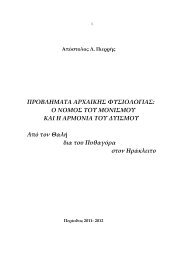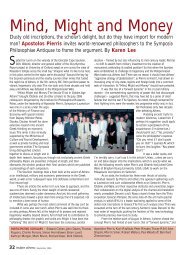APPENDIX C΄ ON DEPILATION: BODY COSMETICS IN CLASSICAL ...
APPENDIX C΄ ON DEPILATION: BODY COSMETICS IN CLASSICAL ...
APPENDIX C΄ ON DEPILATION: BODY COSMETICS IN CLASSICAL ...
You also want an ePaper? Increase the reach of your titles
YUMPU automatically turns print PDFs into web optimized ePapers that Google loves.
<strong>ON</strong> DEPILATI<strong>ON</strong>: <strong>BODY</strong> <strong>COSMETICS</strong> <strong>IN</strong> <strong>CLASSICAL</strong> ANTIQUITY 585<br />
âΛÓÔȘ ¯Ú‹ÛÂȘ ëÙ¤ÚÔȘ apple·ÚÂÖ¯ÔÓ, etc. We see depilation in a context<br />
of unrestrained pleasure hunting, especially connected with<br />
uninhibited and promiscuous homosexual practices. (Cf. the strong<br />
expressions used by Theopompus in what follows this passage).<br />
Sometimes close shaving of the beard and depilation of the pubic<br />
and anal region (indicating, as we saw above, a special proclivity to<br />
sexual passivity, cf. e.g. the already quoted epigram CXXXI by<br />
Ausonius) were considered to be connected: v. Athenaeus XIII, 565 sq.<br />
(cf. 564 sq.: ñÌÂÖ˜ ‰b ͢ÚÔ˘Ì¤ÓÔ˘˜ Ùa Á¤ÓÂÈ· appleÂÚÈʤÚÂÙ ÙÔf˜ âڈ̤-<br />
ÓÔ˘˜) speaking about some cynically orientated Stoics, who were in<br />
the habit of accusing anyone dressed with the slightest elegance or<br />
wearing perfume as being ΛӷȉԘ, remarks: Ôé ‰ÂÖ ÔsÓ Ô≈Ùˆ˜ âÛÙ·Ï-<br />
̤ÓÔ˘˜ (they used to wear only wretched, dirty small pieces of rough<br />
cloth) appleÂÚd àÚÁ‡ÚÈÔÓ âappleÙÔÉÛı·È, ηd âڈ̤ÓÔ˘˜ appleÂÚÈ¿ÁÂÛı·È ͢ÚÔ˘-<br />
̤ÓÔ˘˜ ÙcÓ ñapple‹ÓËÓ Î·d ÙeÓ ùÚÚÔÓ, etc. Cf. Lucian, De Mercede<br />
Conductis, 33, where one ÙáÓ appleÂappleÈÙÙˆÌ¤ÓˆÓ Ùa ÛΤÏË Î·d ÙeÓ<br />
appleÒÁˆÓ· appleÂÚÈÂ͢ÚËÌ¤ÓˆÓ is a thoroughly effeminate man. On the<br />
other hand some were particularly industrious at keeping their sexual<br />
organ and anus free of hair, while unattentive in a similar way to the<br />
rest of their body: Lucian, Pseudologista, 31: ÎàÎÂÖÓ·, Âå ‰ÔÎÂÖ, ôÊÂÏÂ,<br />
Ùe Ì‡Úˇˆ ¯Ú›ÂÛı·È Ùa˜ appleÔÏÈa˜ ηd Ùe appleÈÙÙÔÜÛı·È ÌfiÓ· âÎÂÖÓ·. Âå ÌbÓ<br />
ÁaÚ ÓfiÛÔ˜ ÙȘ âapple›ÁÂÈ, ±apple·Ó Ùe ÛáÌ· ıÂÚ·appleÂ˘Ù¤ÔÓØ Âå ‰b ÌˉbÓ<br />
ÓÔÛÂÖ˜ ÙÔÈÔÜÙÔÓ, Ù› ÛÔÈ ‚Ô‡ÏÂÙ·È Î·ı·Úa ηd ÏÂÖ· ηd çÏÈÛıËÚa<br />
âÚÁ¿˙ÂÛı·È, L Ìˉb ïÚÄÛı·È ı¤ÌȘ (the last clause does not fit with the<br />
Hellenic sentiment, of course, according to which they are ·å‰ÔÖ·,<br />
pudenda, not unseeable). Cf. also Lucianus, Rhetorum praeceptor, 24:<br />
ηd ÌcÓ Î·d appleÈÙÙÔÜÛı·È ¯Úc Ì¿ÏÈÛÙ· ÌbÓ Ùa apple¿ÓÙ· (sc. ̤ÚË ÙÔÜ<br />
ÛÒÌ·ÙÔ˜), Âå ‰b Ì‹, apple¿ÓÙˆ˜ âÎÂÖÓ· (sc. the privy parts).<br />
The practice was not restricted to low people. Julius Caesar himself<br />
was thought to submit to it: Suetonius, Divus Julius 45: circa corporis<br />
curam morosior, ut not solum tonderetur diligenter ac raderetur, sed<br />
velleretur etiam, ut quidam exprobraverunt. (Cf. the already quoted<br />
passage, Plutarch, J. Caesar 17: ηd ÙcÓ Û¿Úη Ï¢Îe˜ ηd êapple·Ïfi˜ sc.<br />
Caesar). Emperor Otho also did the same thing; Suetonius, Otho, 12:<br />
…munditiarum vero paene muliebrium, vulso corpore, galeniculo<br />
capiti propter raritatem capillorum adaptato et annexo, ut nemo<br />
dinosceret. Naturally, if emperors adopted the practice it could not<br />
have been a rare thing among eminent administrators; e.g. consider










